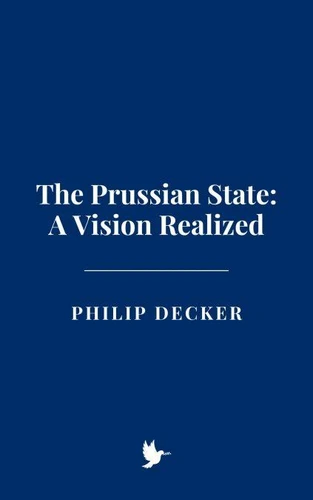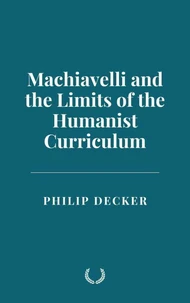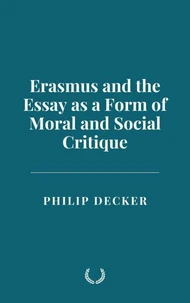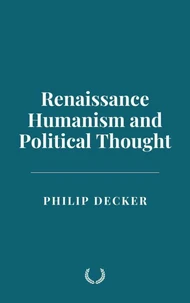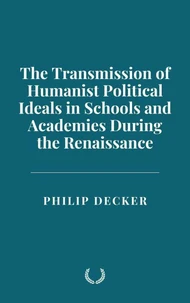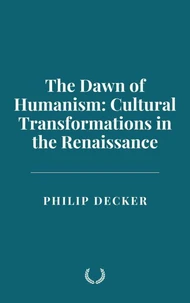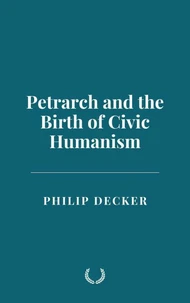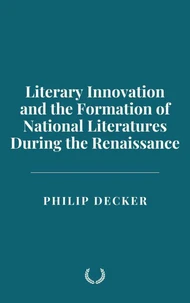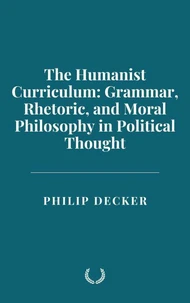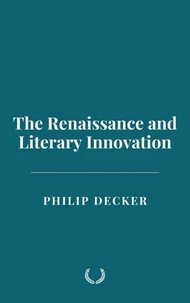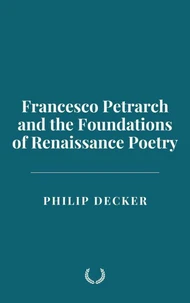The Prussian State: A Vision Realized
Par :Formats :
Disponible dans votre compte client Decitre ou Furet du Nord dès validation de votre commande. Le format ePub est :
- Compatible avec une lecture sur My Vivlio (smartphone, tablette, ordinateur)
- Compatible avec une lecture sur liseuses Vivlio
- Pour les liseuses autres que Vivlio, vous devez utiliser le logiciel Adobe Digital Edition. Non compatible avec la lecture sur les liseuses Kindle, Remarkable et Sony
 , qui est-ce ?
, qui est-ce ?Notre partenaire de plateforme de lecture numérique où vous retrouverez l'ensemble de vos ebooks gratuitement
Pour en savoir plus sur nos ebooks, consultez notre aide en ligne ici
- FormatePub
- ISBN8230181941
- EAN9798230181941
- Date de parution14/03/2025
- Protection num.pas de protection
- Infos supplémentairesepub
- ÉditeurIndependently Published
Résumé
The Prussian State: A Vision Realized delves into the rise, dominance, and eventual decline of the Prussian state, exploring how its military prowess, efficient bureaucracy, and deeply ingrained sense of discipline shaped not only Prussia but also the broader European political landscape. From the early formation of Brandenburg-Prussia under Frederick William, the Great Elector, to the transformative reign of Frederick the Great, the book traces Prussia's evolution from a fragmented electorate into the dominant force behind the unification of Germany in 1871.
The narrative focuses on the central role of the Prussian military and state bureaucracy in the creation of a powerful, centralized empire, while also examining the intellectual and educational reforms that laid the groundwork for the rise of German nationalism. As Prussia transitioned into the German Empire, the legacy of its militaristic traditions, coupled with its bureaucratic efficiency, became deeply embedded in the fabric of German society.
However, the very ideals that had led to its rise-such as discipline, loyalty to the state, and the emphasis on centralized authority-eventually contributed to its decline. The political, social, and economic changes that followed Bismarck's unification of Germany set the stage for the eventual collapse of the Prussian-dominated empire, culminating in World War I and the abdication of the monarchy in 1918.
The book further examines the enduring legacy of Prussianism, which continued to shape Germany throughout the 20th century, influencing both the rise of Nazi ideology and the reconstruction of post-war Germany. Through an analysis of military strategy, educational reform, and statecraft, the book offers a comprehensive understanding of how Prussia's vision for a unified, militarized, and bureaucratically controlled state played a central role in shaping the modern German identity and its tumultuous history. 4o mini
The narrative focuses on the central role of the Prussian military and state bureaucracy in the creation of a powerful, centralized empire, while also examining the intellectual and educational reforms that laid the groundwork for the rise of German nationalism. As Prussia transitioned into the German Empire, the legacy of its militaristic traditions, coupled with its bureaucratic efficiency, became deeply embedded in the fabric of German society.
However, the very ideals that had led to its rise-such as discipline, loyalty to the state, and the emphasis on centralized authority-eventually contributed to its decline. The political, social, and economic changes that followed Bismarck's unification of Germany set the stage for the eventual collapse of the Prussian-dominated empire, culminating in World War I and the abdication of the monarchy in 1918.
The book further examines the enduring legacy of Prussianism, which continued to shape Germany throughout the 20th century, influencing both the rise of Nazi ideology and the reconstruction of post-war Germany. Through an analysis of military strategy, educational reform, and statecraft, the book offers a comprehensive understanding of how Prussia's vision for a unified, militarized, and bureaucratically controlled state played a central role in shaping the modern German identity and its tumultuous history. 4o mini
The Prussian State: A Vision Realized delves into the rise, dominance, and eventual decline of the Prussian state, exploring how its military prowess, efficient bureaucracy, and deeply ingrained sense of discipline shaped not only Prussia but also the broader European political landscape. From the early formation of Brandenburg-Prussia under Frederick William, the Great Elector, to the transformative reign of Frederick the Great, the book traces Prussia's evolution from a fragmented electorate into the dominant force behind the unification of Germany in 1871.
The narrative focuses on the central role of the Prussian military and state bureaucracy in the creation of a powerful, centralized empire, while also examining the intellectual and educational reforms that laid the groundwork for the rise of German nationalism. As Prussia transitioned into the German Empire, the legacy of its militaristic traditions, coupled with its bureaucratic efficiency, became deeply embedded in the fabric of German society.
However, the very ideals that had led to its rise-such as discipline, loyalty to the state, and the emphasis on centralized authority-eventually contributed to its decline. The political, social, and economic changes that followed Bismarck's unification of Germany set the stage for the eventual collapse of the Prussian-dominated empire, culminating in World War I and the abdication of the monarchy in 1918.
The book further examines the enduring legacy of Prussianism, which continued to shape Germany throughout the 20th century, influencing both the rise of Nazi ideology and the reconstruction of post-war Germany. Through an analysis of military strategy, educational reform, and statecraft, the book offers a comprehensive understanding of how Prussia's vision for a unified, militarized, and bureaucratically controlled state played a central role in shaping the modern German identity and its tumultuous history. 4o mini
The narrative focuses on the central role of the Prussian military and state bureaucracy in the creation of a powerful, centralized empire, while also examining the intellectual and educational reforms that laid the groundwork for the rise of German nationalism. As Prussia transitioned into the German Empire, the legacy of its militaristic traditions, coupled with its bureaucratic efficiency, became deeply embedded in the fabric of German society.
However, the very ideals that had led to its rise-such as discipline, loyalty to the state, and the emphasis on centralized authority-eventually contributed to its decline. The political, social, and economic changes that followed Bismarck's unification of Germany set the stage for the eventual collapse of the Prussian-dominated empire, culminating in World War I and the abdication of the monarchy in 1918.
The book further examines the enduring legacy of Prussianism, which continued to shape Germany throughout the 20th century, influencing both the rise of Nazi ideology and the reconstruction of post-war Germany. Through an analysis of military strategy, educational reform, and statecraft, the book offers a comprehensive understanding of how Prussia's vision for a unified, militarized, and bureaucratically controlled state played a central role in shaping the modern German identity and its tumultuous history. 4o mini

